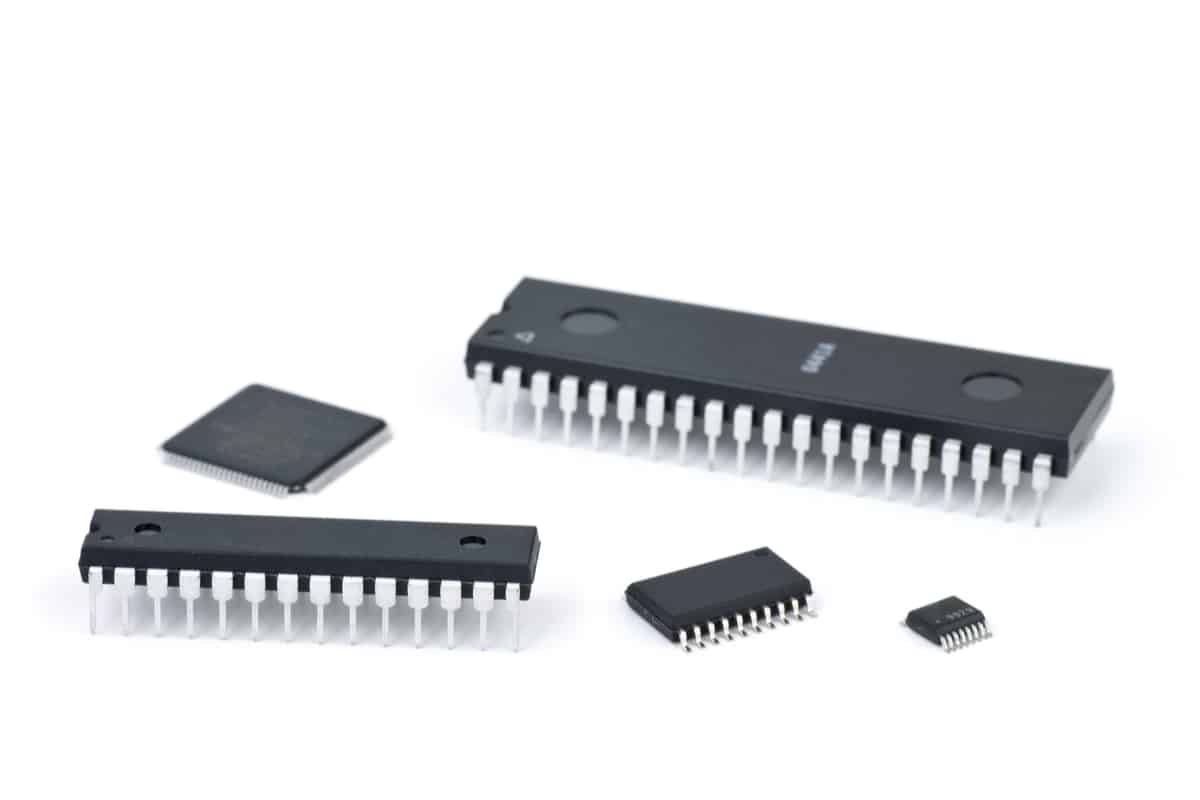
The MSP430 MCU from Texas Instruments comes in some of these standard SMD and through-hole packages.
A few popular MCUs have dominated the embedded marketplace: Atmel’s iconic Atmega328P is massively popular thanks to the Arduino platform, STM32 and ESP8266 are two of the most popular 32-bit MCUs, and Microchip PIC MCUs are popular for networking equipment. Filling another niche in the embedded world is the MSP430 MCU, which has plenty of programming support directly from the manufacturer as well as compatible firmware support from the open-source community.
If you’re looking for an MSP430 datasheet, you’ll find there are many variants with slightly different specifications, peripheral features, and processing capabilities. All MSP430 variants have a few qualities in common: they have low power consumption ratings, RISC architecture, and digital interfaces for communicating with other components. For the remaining electrical and physical specifications, you’ll need to find the right MSP430 datasheet.
The MSP430 MCU
The MSP430 is Texas Instrument’s flagship MCU component line. These devices are specifically marketed as low-power MCUs for precision sensing and measurement applications. For the embedded designer, these components are a great option for collecting measurements and data from various sensors and peripheral components.
MSP430 Variants
Like many ICs, passives, and other components, the MSP430 comes in several variants. Each variant comes with a few core features, but these variants have different clock speeds, bit depth, package, pin count, pinout, Flash memory, and additional features. Unlike passives (such as SMD capacitors), Texas Instruments does not compile a thorough product comparison into a single datasheet or guide. Therefore, it helps to see some of the differences between variants to help select the appropriate component.
The table below shows some of the core specifications that apply to all MSP430 components. These specifications usually form the starting point for selecting an MSP430 MCU.
| Specification | Value |
| Supply voltage | From 900 mV to 3.6 V, depending on variant |
| Onboard memory |
|
| Clock frequency | Up to 32 MHz |
| Data bus width | 8, 16, or 32 bit |
| ADC specifications | 8/10/12/16/24 bit ADC with up to 20 channels |
| Core architecture | RISC |
| Operating temperature |
|
| GPIO count | 4 to 90 |
| Optional features and peripherals |
|
Aside from these core specifications and features, MSP430 MCUs come in a range of packages, all of which will have different pin counts and pinouts. Different packages and variants target a range of applications that designers should consider when selecting components.
Applications
The MSP430 MCU targets lightweight embedded applications that don’t require high compute power, such as industrial monitoring or automation with high sensor count. Other lightweight embedded applications include peripherals in simple HMI units, automotive ECUs, simpler wearables, and other subsystems in a larger embedded system. For higher compute applications, where complex algorithms need to be implemented while handling large datasets, one might consider a more powerful MCU or even a single-board computer. Ideal applications for specific MSP430 variants can be found in component datasheets.
Where to Find an MSP430 Datasheet
No matter which variant of the MSP430 you want to use, you’ll need to get the datasheet corresponding to that particular variant. There are groups of variants that have nearly the same specifications but come in slightly different packages. To find the datasheet you need, you could go to Texas Instruments and enter the MPN directly into their search tools. However, there may be times where you haven’t settled on a specific MPN but still need to conduct a search.
In those cases, there are two ways to utilize an electronic parts search engine to find an MSP430 datasheet and component without settling on a specific MPN:
- By specification: Searching by any of the main specifications helps you filter through multiple MPNs/variants and gets you to a shorter list of components. Common searches are by bit depth, clock speed, or package.
- By MPN: You don’t need to search by a specific MPN, you can just search by the MPN prefix (e.g., MSP430F or MSP430B).
This will help you narrow down to a smaller range of components with various electrical specifications and packages.
Finding MSP430 datasheets is easy with an electronics search engine
In addition to datasheets, a quality electronics search engine will also give you access to aggregated distributor data, PCB footprints, prices, availability, and alternatives. Try using an electronics search engine the next time you need datasheets or sourcing information for your components.
When you’re looking for an MSP430 datasheet and technical specifications, try using the electronics search engine features in Ultra Librarian. In addition to component data, you’ll have access to verified component models that can be imported into popular ECAD applications. You’ll also have access to sourcing information from worldwide distributors.
Working with Ultra Librarian sets up your team for success to ensure any design is going through production and validation with accurate models and footprints to work from. Register today for free.